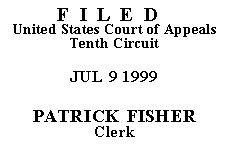 UNITED STATES COURT OF APPEALS
UNITED STATES COURT OF APPEALS
 UNITED STATES COURT OF APPEALS
UNITED STATES COURT OF APPEALS
TENTH CIRCUIT
| RAYMOND E. KENNEY, | |
| v. | Nos. 98-1317
98-1324 |
| STATE OF COLORADO and ATTORNEY GENERAL FOR THE STATE OF COLORADO, | (D.C. No. 97-D-2218)
(D. Colo) |
ORDER AND JUDGMENT(*)
Before SEYMOUR, Chief Judge, BALDOCK, and HENRY, Circuit Judges.(**)
Petitioner Raymond E. Kenney seeks a certificate of appealability and in forma pauperis status to appeal the district court's order dismissing his 28 U.S.C. § 2254 petition for a writ of habeas corpus. We conclude Petitioner has not made a substantial showing of the denial of a constitutional right. Accordingly, we deny his request for a certificate of appealability and dismiss the appeal. Petitioner's motion to proceed in forma pauperis is denied as moot.
On September 23, 1996, Petitioner began serving a prison term in Hawaii. Approximately two months later, on November 20, 1996, prison officials received a detainer for Petitioner from the State of Colorado. The State of Colorado apparently sought to extradite Petitioner for use of an unauthorized credit instrument. Petitioner learned about the detainer on February 21, 1997. On April 1, 1997, Petitioner advised the Warden of the Hawaii State Penitentiary, in writing, of his wish to have a final disposition of the charges underlying the Colorado detainer. The Warden forwarded Petitioner's request to the Eagle County, Colorado District Attorney. The State of Colorado did not act on Petitioner's request until August 11, 1997, when it extradited him to face the Colorado charge. On November 25, 1997, Petitioner pled guilty in Colorado state court to use of an unauthorized credit instrument and received a ninety-day sentence.
While incarcerated in Colorado, Petitioner filed the instant habeas petition in the district court complaining that prior to pleading guilty to the Colorado charges, he was deprived of his rights to due process and equal protection when respondents violated: (1) the Interstate Agreement on Detainers Act (IADA) by not giving him notice that Colorado authorities were lodging a state detainer against him while he was incarcerated in Hawaii; (2) the IADA by bringing him to trial more than 180 days after he requested a final disposition of the charges; and (3) the Uniform Criminal Extradition Act by not providing him with a pretransfer hearing. The district court dismissed the petition. Petitioner has since served the Colorado sentence and is currently residing in Hawaii. Because Petitioner has already been extradited to Colorado, convicted under its laws, and served the Colorado sentence, his habeas petition is moot. See Kearns v. Turner, 837 F.2d 336 (8th Cir. 1988); Burrus v. Turnbo, 743 F.2d 693 (9th Cir. 1984), vacated as moot sub nom, Hijar v. Burrus, 474 U.S. 1016 (1985). Accordingly, we are without jurisdiction to hear his appeal.
In any event, Petitioner would not be entitled to a certificate of appealability even if we assumed that his application for habeas relief were not moot.(1) We may grant a certificate of appealability only where a Petitioner demonstrates the substantial showing of the denial of a constitutional right. United States v. Simmonds, 111 F.3d 737, 746 (10th Cir. 1997). Assuming that the alleged violations of the IADA and UCEA rise to the level of constitutional violations, Petitioner's argument must fail. "When a criminal defendant has solemnly admitted in open court that he is in fact guilty of the offense with which he is charged, he may not thereafter raise independent claims relating to the deprivation of constitutional rights that occurred prior to the entry of the guilty plea." Tollett v. Henderson, 411 U.S. 258, 267 (1973). Defendant pled guilty in Colorado state court after the alleged constitutional violations occurred. Consequently, he waived his right to raise them in a subsequent appeal. See id. Therefore, because he cannot make a substantial showing of the denial of a constitutional right, Petitioner is not entitled to a certificate of appealability.
APPEALS DISMISSED; MOTION TO PROCEED IN FORMA PAUPERIS DENIED.
Entered for the Court,
Bobby R. Baldock
Circuit Judge
*. This order and judgment is not binding precedent, except under the doctrines of law of the case, res judicata, and collateral estoppel. The court generally disfavors the citation of orders and judgments; nevertheless, an order and judgment may be cited under the terms and conditions of 10th Cir. R. 36.3.
**. After examining the briefs and appellate record, this panel has determined unanimously that oral argument will not materially assist the disposition of this appeal. See Fed. R. App. P. 34(a)(2)(C). The case is therefore ordered submitted without oral argument.
1. The district court dismissed Petitioner's habeas application on July 22, 1998. On August 17, 1998, Petitioner filed a "Financial Affidavit" which the district court construed as a timely filed notice of appeal. Construing the "Financial Affidavit" as the functional equivalent of a timely filed notice of appeal, see Smith v. Barry, 502 U.S. 244, 248-49 (1992), we assigned case number 98-1317 to Petitioner's appeal. On August 24, 1998, Petitioner filed a pro se "notice of appeal." We assigned case number 98-1324 to that appeal. Under Fed. R. App. P. 4(a)(1), a Petitioner appealing from the denial of habeas relief has thirty days in which to file a notice of appeal. Petitioner filed his second notice of appeal four days past the thirty-day deadline. Compliance with Rule 4 is mandatory and jurisdictional. Accordingly, we have no jurisdiction to reach the merits of 98-1324, and DISMISS that appeal.